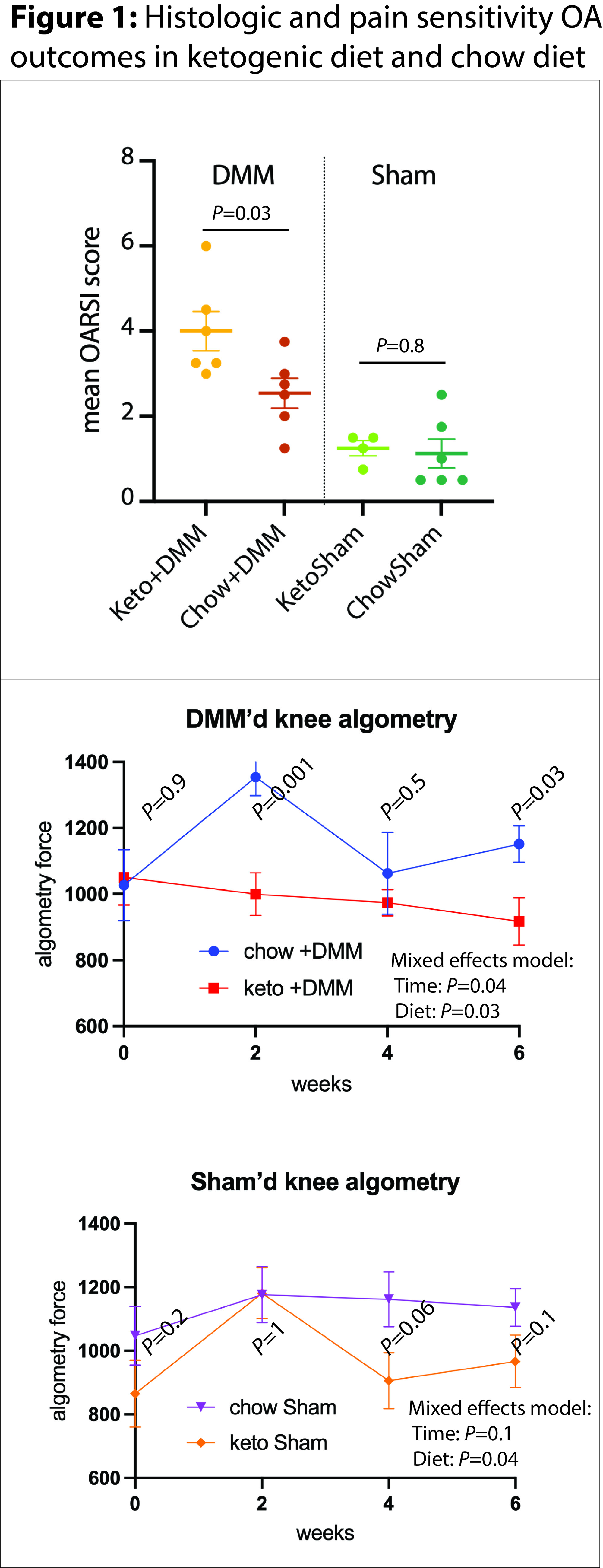Session Information
Date: Monday, November 13, 2023
Title: (0859–0885) Osteoarthritis & Joint Biology – Basic Science Poster
Session Type: Poster Session B
Session Time: 9:00AM-11:00AM
Background/Purpose: A ketogenic diet (KD) has beneficial effects in preclinical models of a variety of systemic autoimmune diseases. In this study, we set out to evaluate whether KD would alter OA outcomes in a commonly-used mouse model.
Methods: Adult male B6 mice (n=6 per group) had disruption of the medial meniscus (DMM) surgery performed on a unilateral knee joint, then were placed in clean cages and fed a standard chow diet or KD (carbohydrates replaced by plant-based oils including medium-chain triglycerides). A second set of mice were fed KD or chow and had sham DMM surgery performed. Pain sensitivity around the operated knee was tested by a handheld algometer at baseline, 2, 4, and 6 weeks after DMM and analyzed with a mixed-effects model. Eight weeks after DMM, mice were sacrificed, knee joints fixed, paraffin-embedded, stained with Safranin-O and histologically graded for OARSI score. Serum cytokines were evaluated with a Bioplex-pro 23 assay. Serum lipopolysaccharide (LPS) was determined by chromogenic assay. Gut microbiome analysis was performed via 16S sequencing.
Results: KD mice had worse histologic OA compared to chow diet mice (Figure 1) (OARSI score 4.0±1.8 mean±SEM vs. 2.5±0.4, P=0.03) despite losing weight on KD (final weight chow: 31±0.7 vs. 25±0.7g, P=2E-4). OARSI scoring was no different in sham mice (1.25±0.2 vs. 1.13±0.3, P=0.8); sham mice lost a similar amount of weight on KD (chow: 33±0.6 vs. 29±0.8, P=0.002). Pain sensitivity was similar at baseline in DMM mice (P=0.9) and sham mice (P=0.2); however, KD mice demonstrated increased pain sensitivity, evidenced by reduced algometry force-at-paw-withdrawal, in both DMM (mixed effects model P=0.03) and sham (mixed effects model P=0.04) (Figure 1). LPS was reduced in KD-DMM mice vs. to chow-DMM mice (P=0.04), but no different in KD-Sham mice vs. chow-Sham mice (P=0.1). Microbiome analysis demonstrated several significantly different clades between KD and chow diet. Lactobacillus, Blautia, and Clostridium were all correlated with better histology and pain outcomes, whereas Bacillales and Oscillospira were correlated with worse histology and pain outcomes.
Conclusion: Initiation of a KD immediately after DMM induction in mice is associated with worse histologic and pain outcomes, findings which correlate with disruption of particular gut microbiome clades. Further research is needed to evaluate the effects of KD initiation prior to OA induction, as well as pathophysiological investigations into this observed phenotype.
To cite this abstract in AMA style:
Barrett M, Dyson G, Khan M, Hanebutt N, Miranda C, Schlupp L, Holmlund E, Jeffries M. Mice Fed a Well-formulated Ketogenic Diet After OA Induction Develop Worse OA Outcomes and Increased Pain Sensitivity [abstract]. Arthritis Rheumatol. 2023; 75 (suppl 9). https://acrabstracts.org/abstract/mice-fed-a-well-formulated-ketogenic-diet-after-oa-induction-develop-worse-oa-outcomes-and-increased-pain-sensitivity/. Accessed .« Back to ACR Convergence 2023
ACR Meeting Abstracts - https://acrabstracts.org/abstract/mice-fed-a-well-formulated-ketogenic-diet-after-oa-induction-develop-worse-oa-outcomes-and-increased-pain-sensitivity/

